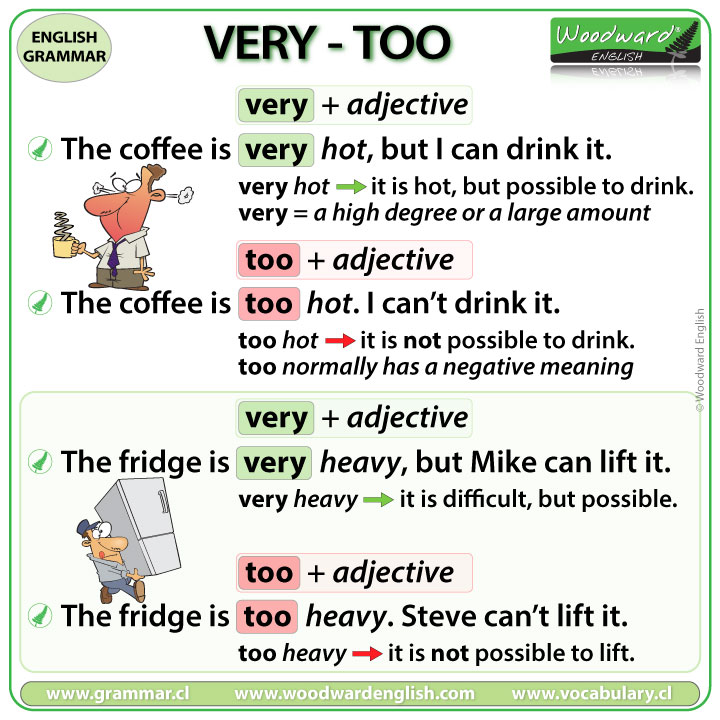Look at these two sentences:
- The coffee is very hot, but I can drink it.
- The coffee is too hot. I can’t drink it.
We use VERY and TOO before an adjective.
Very + adjective … and… Too + adjective
It both sentences the adjective is hot so we say very hot and too hot.
What is the difference in meaning?
Very hot means it is hot, but possible to drink.
Too hot means it is NOT possible to drink, probably because I will burn myself.
Very means a high degree or a very large amount.
Too normally has a negative meaning.
Let’s look at another example:
- The fridge is very heavy, but Mike can lift it.
Here we are saying it is difficult for Mike but it is still possible for him to lift it.
- The fridge is too heavy. Steve can’t lift it.
Here we are saying it is NOT possible for Steve to lift it, it is impossible because it is too heavy for him. He needs to eat more spinach.
You can see that in this sentence TOO has a negative meaning again.
One more example:
- It was very cold, but we played football anyway.
Yes, it was difficult but still possible. My legs were frozen but we still had a good time.
- It was too cold to play football, so we stayed at home.
Again TOO has a negative meaning. Too cold means it was excessively cold so it wasn’t possible to play football.
Note: we do NOT say… it was very much cold… or too much cold.
These are NOT correct in English.
We will see more about too much and too many in another lesson.

Very + Adverb
After VERY we can use an adverb. There is a verb before these so the structure is:
Verb + Very + Adverb
Our example sentences:
- She ran very quickly and won the race. She didn’t just run quickly… she ran VERY quickly.
- We played very badly and lost.
Note: it is better to use another adverb instead of very + adverb.
For example, instead of saying very badly, you could say terribly.
- We played terribly and lost.
Too + Adverb
We can also create a sentence using TOO instead of VERY.
Verb + Too + Adverb
- He drove too quickly and had an accident.
- I arrived too early and nobody was there.
- He speaks too quietly. I can’t hear what he says.
You can see again that TOO usually has a negative meaning or result.
He drove too quickly… and the negative result of this… he had an accident.
I arrived too early… and the negative result of this… I had nobody to talk to.
